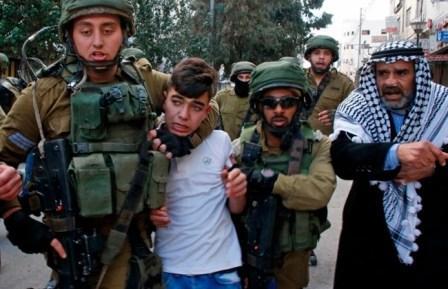
While the most prominent Palestinian teenage activist, Ahed Tamimi, was released Sunday, hundreds of Palestinian minors still languish in Israeli prisons, facing ill-treatment and a lack of swift justice.
Currently 290 Palestinian minors are detained in Israeli prisons, including 49 under the age of 16, according to Addameer Prisoner Support and Human Rights Association. Children are generally arrested for throwing stones during protests, critical social media posts and on allegations they intended to attack Israelis.
With extensive databases of personal information, Israeli intelligence officers monitor phone calls, social media posts and political activities of Palestinians, the head of the Palestinian Prisoners Club, Qadoura Fares, told The Daily Star.
“There is a psychological aspect behind the regular arrest of children. Israel has launched a ‘war of attrition’ on Palestinian families. It seeks to exhaust them morally and make them live under stress,” he said.
So far this year, the number of imprisoned minors varied between 291 and 356 a month, although it has reached over 400 in previous years. The Military Court Watch says approximately 800-1,000 children are detained every year.
In January, Mohammad al-Hajj Mohammad and Ahmed Zaqzouq, both 14, were walking toward the Israeli Zaatara checkpoint south of Nablus city when soldiers shot them from a distance of 60 meters.
The soldiers claimed that the boys were carrying knives and had been warned not to approach the post.
They were taken away by an Israeli ambulance and later detained without their parents being notified by authorities. Farhan al-Hajj Mohammad, the father of one of the boys, said he found out about the incident through social media, when someone sent him a photo of his son’s arrest.
“A disaster had befallen our family. He had just been with me at home. It’s completely absurd, he was not a threat but the soldiers acted as if he was carrying a Kalashnikov,” he said.
Both families denied to The Daily Star that their children could have been carrying knives.
“My son simply does not have the frame of mind to carry a knife, let alone attack Israeli soldiers. It’s just not who he is,” Farhan said.
Seven months later, Mohammad and Zaqzouq are still detained without charges. The boys’ parents said the court keeps delaying their trial, and there is no way of knowing how long they will remain in prison, which is putting a huge strain on both families.
“At home we can’t find joy in anything anymore. If Mohammad was older, we would have felt that he could handle himself but he’s only a child. He had never even participated in a protest before,” Farhan said.
Detainees are allowed to see lawyers, but Fares says their role can be very limited since Palestinians are tried in military courts instead of civilian courts. The conviction rate for Palestinian cases in military courts is 99 percent, according to the Military Court Watch.
During family visits, which are permitted twice a month for 45 minutes, visitors and the detainees are separated by a glass window, and physical contact is forbidden.
“Not being able to touch or hold my son made me feel like I was going to burst. He cried his eyes out the first time he saw me. His morale is very low,” Farhan said.
The head of the Palestinian Prisoner’s Club, the oldest organization for prisoners’ affairs, said the conditions of visitation halls compromise the little time the families have with their loved ones.
The halls are generally overcrowded and loud, which doesn’t leave room for any form of privacy or solace.
In prison, Palestinian children are subjected to various forms of psychological and physical abuse. They are constantly put under duress by demeaning treatment, sleep deprivation, solitary confinement, beatings, prolonged forced positioning – an extremely painful practice that can cut blood circulation.
Prison authorities reportedly also adopt a range of humiliating measures, including making detainees strip before throwing cold water on them, shouting obscenities at young detainees and cursing family members.
“I’m always feeling emotionally stressed and unable to stop thinking about my experience in prison,” said Anas Athbeh, a 17-year-old who was arrested in February during a raid on the occupied West Bank village of Qalqilya.
Athbeh was detained for throwing rocks at Israeli forces during a demonstration and was released five months later. He said he felt forced to confess after being left for three days without food and then taken for an hourslong interrogation.
Another common practice in Israeli prisons is the attempt to recruit minors as informants in exchange for leniency. Informants are forced to provide information on Palestinians involved in advocacy or other children participating in protests.
“They threaten the children that their parents will get arrested if they don’t cooperate, thus putting a child under immense psychological pressure and feelings of guilt,” Fares said.
After their release, minors often lose interest in school and in their daily life. They can suffer from insomnia, isolation and distraction – and their social interactions become limited. Some also “live in fear of getting caught again,” Fares added.
There are currently 5,900 Palestinian political prisoners in Israeli prisons, including 442 held in administrative detention, where Israel holds detainees indefinitely without due process under the allegation court proceedings could expose secretive intelligence information.
As of May 2018, three Palestinian minors are held in administrative detention.
Source: The Daily Star
 FR
FR EN
EN AR
AR








